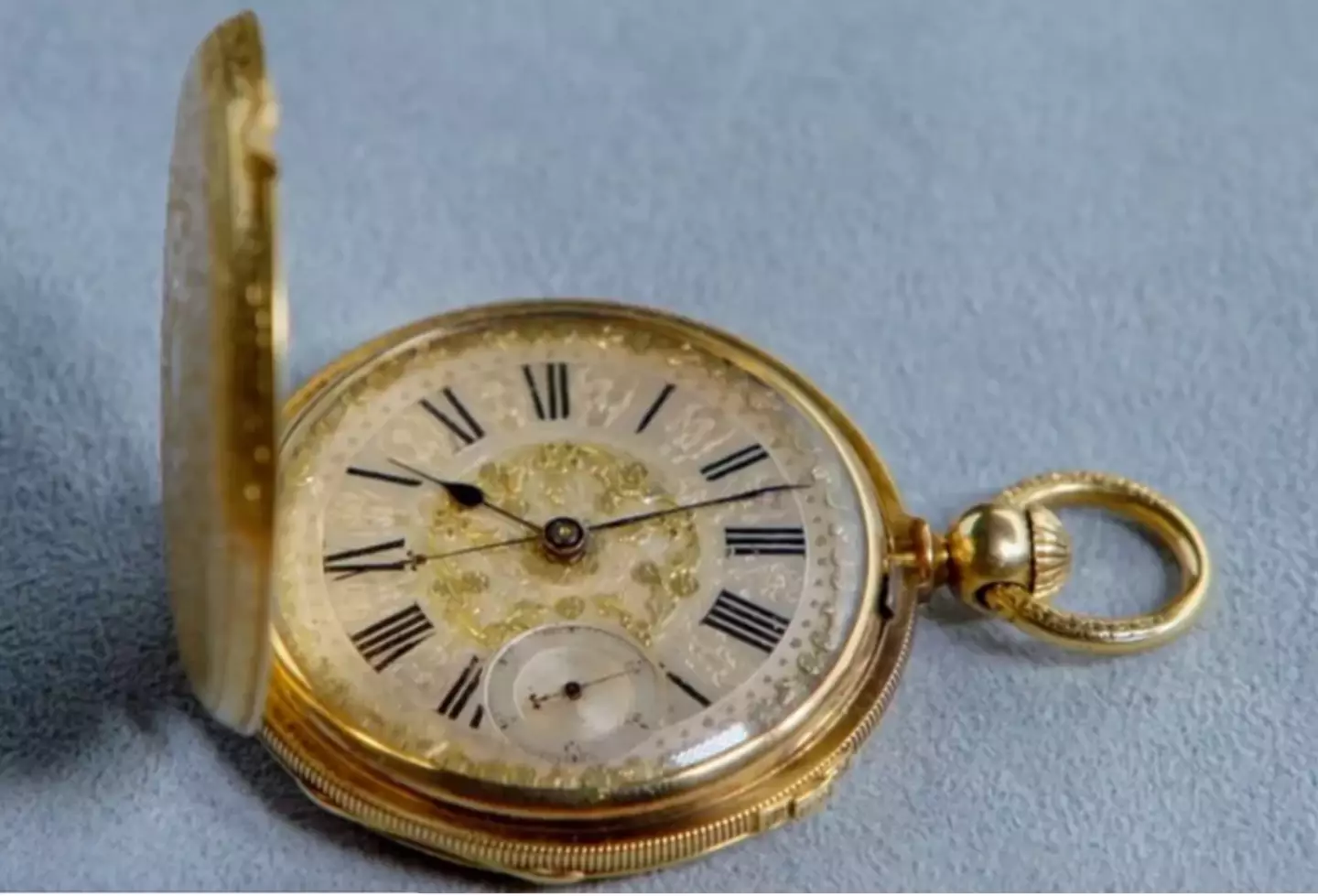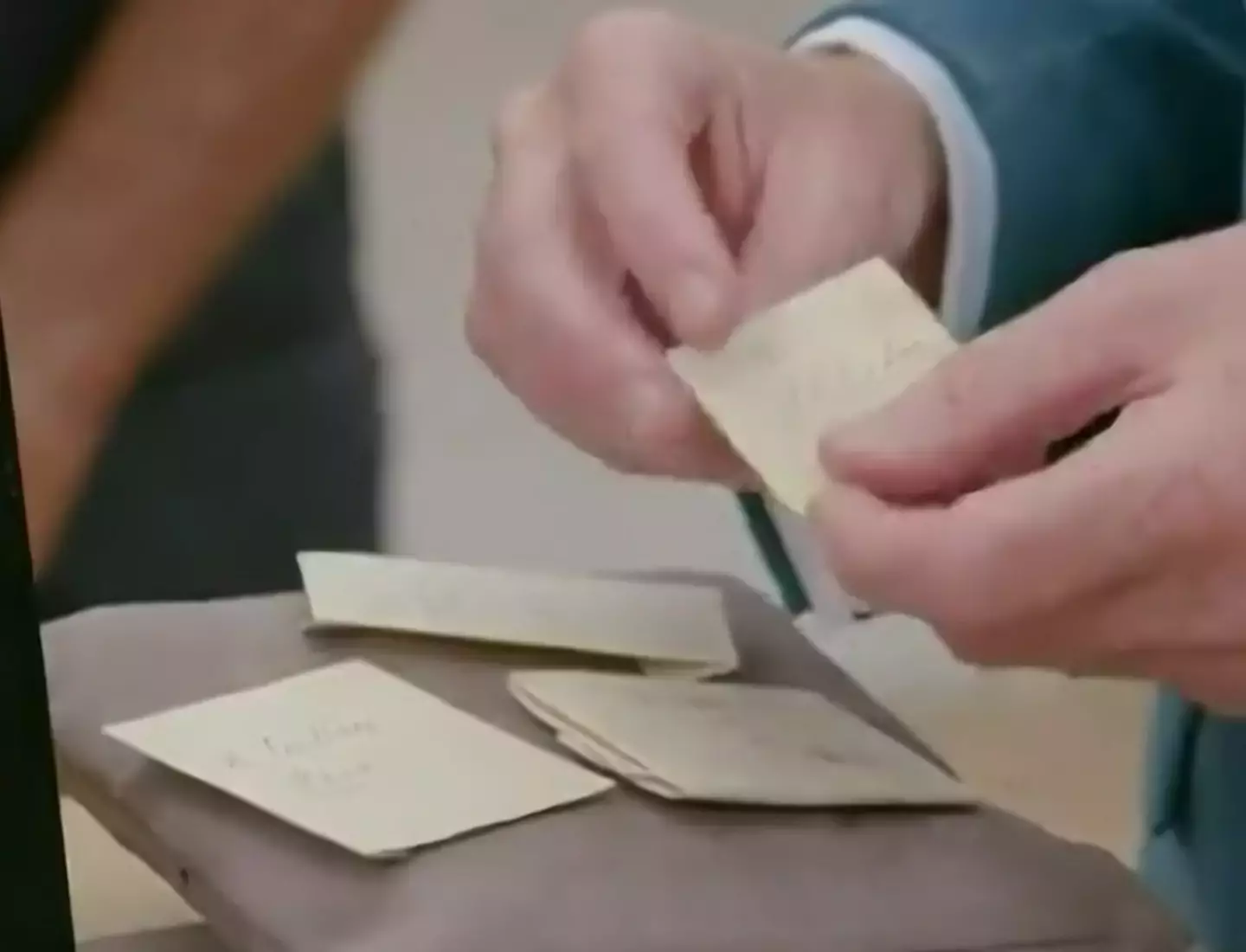In one episode of Antiques Roadshow episode, viewers were in for a little bit of a surprise when a guest refused to sell their gold watch after the expert gave them a warning.
Yep, when the person rocked up to Windermere Jetty Museum in the Lake District, they were keeping tight hold of their fancy little piece.
One guest on the show was previously so surprised by the value of their watch they ‘passed out’ whereas on another episode, the expert refused to value one item.
But it seems the valuation of this golden item all depended on an important factor – if it actually worked or not.
Antiques Roadshow expert Richard Price was presented with a ‘very beautiful’ piece that’s known as a ‘hunting case watch’.
The watch could be ‘very rare’. (BBC)
“If it’s got a very beautiful dial as well, which it has, look at that lovely silver dial, I can say pretty categorically that it is for the Spanish market,” he explained.
The guest seemed to confirm this as it was given to them by a ‘Spanish lady’ who was a family friend.
“Well, what a lucky couple you are. Absolutely typical for the Spanish market, beautiful dials, it’s 18 karat gold, dating from the 1860s,” responded Price.
READ MORE:
ANTIQUES ROADSHOW GUEST IN TEARS AS HE’S TOLD HE’S RICH
MAN SHOCKED BY VALUE OF PAINTING FOLLOWING CLEANER’S HUGE MISTAKE
After being asked if they remembered anything special about the piece, the guest revealed that its previous owner had ‘demonstrated there was a chime’ but was a little confused over what it meant.
This seemed to make sense to Price as he noted the design of the watch before explaining: “A very, very clever horologist by the name of Joseph Barolos, who worked in London devised a form of quarter repeating, which means that the watch will strike the hours and the quarters, turning it to the left to do the hours, releasing it, and turning it to the right to do the quarters.

They’re not selling, apparently. (BBC)
“That is not functioning and all that very complex repeat work will be under the dial and we cannot see if it’s there. The very fact that you recall chiming in other words, some sort of repetition suggests to me almost certainly this watch had and might still have that work there.”
While the guest seemed to get excited about the watch being worth a decent bit, the expert warned them that the item’s value was all depending on whether that ‘quarter repeating’ function was all tickety boo.
“If this is Joseph Barolos’ patent. We’re talking about a very rare thing,” Price explained. “If it’s there, I’m going to quote you £7,000 to £10,000. If it’s not, we’d be looking at £2,500 to £3,000 minimum right. So either way, lovely gift.”
But the suddenly stunned guest responded: “Oh yeah. And it’s not for sale.”
“That’s what you all say,” joked Price.
The strangest items that have appeared on Antiques Roadshow
Some items on the show have just been downright bizarre…
Human hair from famous poets

(BBC)
Ever dreamed of owning the locks of William Wordsworth and Samuel Taylor Coleridge?
Well, it’ll cost you, as when this item was brought on Antiques Roadshow last year it was valued at upwards of £40,000.
The clippings were a family heirloom, and according to expert Justin Croft, one was taken on a person’s deathbed.
Yikes.
Nightmare fuel Teletubbies concept art
Turns out Tinky-Winky, Dipsy, Laa-Laa and Po originally looked pretty scary.
Jonathan Hills drew the concept art for the future children’s TV icons. He sadly died in 2020 and his wife brought some of his original sketches on the show in 2022.
Expert Mark Hill admitted some of the drawings were ‘creepy’, but went on to value the individual pieces between £500 and £2,000, and the entire collection of 80 drawings at up to £80,000.
A bottle of pee
Who could forget the time expert Andy McConnell inadvertently drank urine back in 2016?
A bloke called John found the bottle in his garden, and McConnell used the taste test to figure out what was inside, thinking it was port.
Fast forward to 2019, and Fiona Bruce revealed to McConnell: “Inside were these brass pins, all of these dating from the late 1840s, and the liquid – urine, a tiny bit of alcohol and one human hair.”
It turned out it was a ‘witches bottle’, buried on the threshold of a house as a protection against curses and bad luck.

